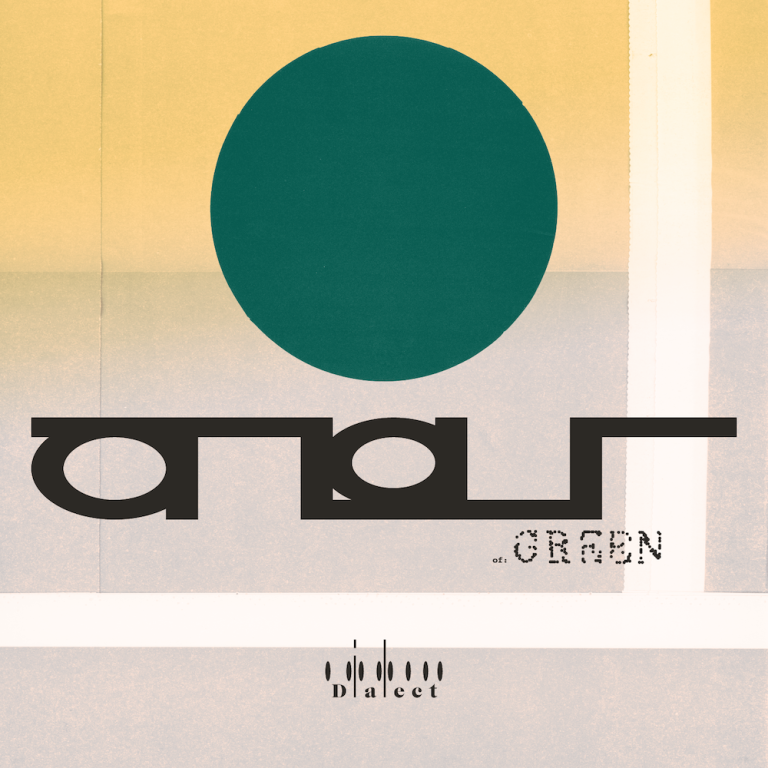Andrew PM Hunt returns to RVNG Intl. with the warmest Dialect record yet: a deceivingly quaint tapestry of soft touches that add up to something loftier.
By this point, Dialect has proven himself several times over for making delicate electronic music that seems to hit emotionally above its weight. Packing a particularly unexpected punch was his recently re-released debut Advanced Myth, in which brooding loops and atmospheres simmered around a few disarming centrepieces: melodic, billowing compositions of horns and synthesisers that burst out of the murk with a startling clarity. 2021’s Under-Between counterposed intricately sampled acoustic instruments with more noticeable digital processing and dynamic shifts. Now, Atlas of Green fits squarely in the Dialect songbook, but presents something a little gentler. Perhaps, though, there’s more lurking beneath the surface.
If Advanced Myth was more Terry Riley, here Hunt finds a tone closer to the zen ambience of Japanese environmental music: “Age & Rain” in particular recalls Hiroshi Yoshimura’s A・I・R (Air In Resort), with its sampled rainfall and a refrain that tilts softly back and forth like a sōzu water fountain. In general, natural themes, textures and rhythms pervade here at multiple levels, which fits Hunt’s own description of the record’s themes and influences: ecological collapse, the sci-fi of Ursula Le Guin.
Suitably, there’s a very organic structure here, similar to his recent live performances as Dialect. More in command than ever, Hunt now plays puppet master to an orchestra of intricately looping, overlapping worlds of sound. Though complex and constantly evolving, these arrangements have a natural kind of progression: an understated sort of symphony, with new voices appearing in surprising but complementary patterns.
Those neat correspondences also tie up the borders of many tracks on Atlas of Green, as when the momentous, Eno-ish piano of “Recreation Story” folds seamlessly into “Born Through”. From the former track’s sustained bed of chords, new peals of pipes babble out of the undergrowth like the tree spirits of Miyazaki’s Princess Mononoke, with their little rattling heads. Where “Recreation Story” peaks with a stirring, key-climbing piano progression, “Born Through” carries forward its sonic residues into a busy shuffle, with its own hefty chords – like a neat little coda.
“Voices” does feel like the right word for these sounds, which so often have an anthropomorphic quality: like strange creatures struggling to express human language, or a skewed human interpretation of animal language. (Think of the creepy awkwardness of Pokémon stuck only speaking their own names.) In “Late Fragment”, for example, actual human voices call and respond to something halfway between a seagull’s cry and the squeak of wet rubber. “Recreation Story”, meanwhile, revolves around a garbled yodel that quickly gets lost among the fluttering of other instruments. Its taut, warping strings and stumbling piano line seem to mirror this noise clumsily, like children crudely copying a new dance move, or that weird alien at the end of Annihilation. And “Overgrown Song” wraps around what sounds like an imprisoned human voice, only audible in snatches revealed in time with percussion, a clapping game for some kind of dark playground ritual.
These voices and textures bubble up, peter out and return familiar, contributing to a neat, cohesive sonic palette. In fact, the overall feel of the record is so cohesive that it sometimes loses focus – entire tracks sometimes passing by without quite making their mark. Stick it on in the background and you get a twinkly ambience that borders on the twee.
Luckily, a few moments tent-pole this patchwork atmosphere – piercing through with a sense of drama and urgency. Highlight and opener “Archaic Quarter Form”, for example, is a slow-burner, boiling the listener like a frog in the pot. It builds soft staccato layers into such a captivating construction that the final piece of the puzzle – a simple, two-chord riff – elevates it to new heights. The album’s title track has a similar effect, with its meandering layers of bagpipe, voice and bass thrums eventually reaching a kind of peak velocity.
Ultimately, it’s on these small crescendos that the record is buoyed up to something higher. A closer listen – and a louder system – reveal moments of surprising heft that can otherwise get lost in the hubbub. It’s like zooming into the grass, Blue Velvet style, and discovering a microscopic world of epic twists and turns invisible to the naked eye. In this way, Atlas of Green offers a map to sonic explorations of the garden variety – but where the garden turns out to be fizzing with life.

